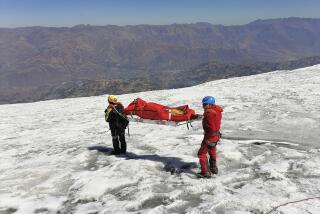S.D. Firm’s High-Tech Test Identifies Dismembered Remains of Soldiers : Science: Pentagon officials hope ‘antibody fingerprinting’ will make the grisly task of reassociating body parts faster and easier.
- Share via
The military will use a high-tech test developed by a San Diego company to assure that all the available body parts from each Gulf War fatality are placed in the proper casket for burial.
This grisly task of identifying dismembered bodies will be performed at the military’s mortuary, at Dover Air Force Base in Delaware.
Officials are hoping that the process will be made easier and faster by “antibody fingerprinting” materials sent to the Department of Defense last week by the San Diego firm, Miragen Inc., said Patricia Snider, the company’s president.
Because of the sensitivity of fatality and dismemberment issues, the Pentagon has asked her company not to discuss specifics, Snider said.
“We filled their order for the number of tests that they requested, but we aren’t commenting on how many,” Snider said.
She said the arrangement is open-ended, however; the military will ask for more testing materials as needed.
“I know this sounds gruesome, but their purpose would be to reassociate body parts. Because there are times when body parts can get separated,” Snider said. “Our country and our military has a dedication to getting the remains back to the family as quickly as possible, and to make accurate identifications. So these tests can help in that regard.”
The testing materials the company provided consist of 5-inch test strips and the chemicals necessary to make antibody fingerprints on them. When the test is done, patterns of light and dark on the paperlike strips look like the bar codes on grocery items.
Each tissue sample requires a single test strip, but they can be processed in batches of 50 or 100 in a few hours, said Amy Percy, vice president for research and development at Miragen.
That is much faster than the best competing high-tech identification tool, a complicated DNA test called genetic fingerprinting that can take days, and that so far has to be performed singly.
The Armed Forces Institute of Pathology also will test genetic fingerprinting to identify fatalities from the Gulf War, said Susan Hansen, a Pentagon spokesman in Washington. She said no one was available to comment on the military’s use of the Miragen procedure.
Miragen’s test is based on findings by Dr. Ann-Michele Francoeur that certain autoimmune system antibodies--proteins that help the body’s cells identify each other--are unique to each individual. Francoeur founded Miragen in 1987.
It is the autoantibody system that gets out of control in autoimmune diseases such as rheumatoid arthritis. These are different than the specific disease-fighting antibodies a person develops in response to a cold or flu.
Indeed, once established in early childhood, a person’s autoantibodies do not appear to change, Percy said. Thus, they can be used as a high-tech ID tag, Francoeur concluded in a 1988 scientific paper.
The possibility of a Gulf War speeded up testing of Miragen’s product. Previously, about a dozen tests of the company’s process were being conducted by medical examiners around the country.
A small military test also had begun last summer, with an eye toward positioning Miragen to compete for use in a computer identification system the military has been contemplating.
Under that system, soldiers’ molecular profiles--whether using DNA or autoantibodies--would be stored permanently in computer-based records.
“We had hoped that sometime during this year we could do a larger pilot study with them,” Snider said. “But a registration system at that point seemed several years down the road. It may be that the conflict speeds up that process.”
Indeed, the company is not charging the military as much for the test materials as their retail cost might be, Snider said: “It’s not much more than cost. We’re not trying to make a huge profit. We’re basically trying to be of service and get the test validated on a broader basis.”
Snider said the company is sensitive to how grisly the application of its new technology may seem. But she sees quick identification of remains as helpful to survivors.
“I had a woman who said to me one time that she had had a niece involved in a plane crash, and that it was very difficult for her sister to come to grips with that,” Snider said. “She didn’t have a way, in a sense, of dealing with the grief. It all had to be done in the abstract.
“In a sense, this is what we’re dealing with here. People have a great deal of sensitivity about it,” she said. “But it’s a fact of life: If you have war, you’re going to have casualties. And so the humane thing to do is to be able to deal with those with as much respect and humanity as possible, and concern for the loved ones.”
More to Read
Inside the business of entertainment
The Wide Shot brings you news, analysis and insights on everything from streaming wars to production — and what it all means for the future.
You may occasionally receive promotional content from the Los Angeles Times.










